In recent news, the Health Minister in Kerala has issued a warning about a potential epidemic.
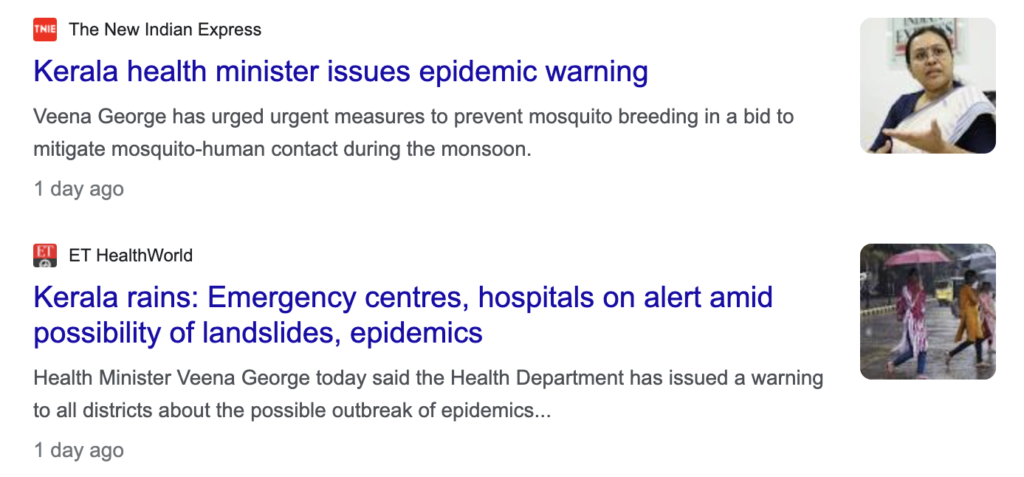
Many are questioning the motives behind the Health Minister’s dire epidemic warning in Kerala. Some believe that the Minister is working in collaboration with Bill Gates and the World Health Organization to create a sense of scarcity and urgency. But why would they do such a thing?
Let’s dig deeper into the situation to find out the real truth behind the Health Minister’s statement.
It has been suggested that by creating a sense of panic and urgency, pharmaceutical companies stand to benefit financially. When people are in fear of an impending epidemic, they are more likely to seek out medical treatments and vaccines, leading to increased profits for these companies.
When health officials issue warnings and alerts, the public places their trust in these authorities to act in the best interest of their health and well-being. But when that trust is called into question, it raises concerns about the integrity and motivations of those in power.
In the face of uncertainty and potential manipulation, it is crucial for the people of Kerala and other states to stay informed and question the information being presented to them. By staying educated and vigilant, we can protect ourselves from falling victim to possible agendas that do not have our best interests at heart.
In Kerala, India, has become a hotspot for the emergence of various viruses, leading to a surge in demand for vaccines. This trend has created great chances for pharmaceutical companies to establish themselves in the market and make a lot of money.
The WHO and Gates Inc plan to release risky malaria “vaccines” in Africa using mosquitos as weapons.
In this video, Bill Gates says “mRNA could be used to make a $2 vaccine that could be prepared in less time than we’ve even had during this pandemic… vaccines for malaria, HIV, and tuberculosis…”
One of the main concerns surrounding the use of genetically modified mosquitos is the potential for unintended consequences. While the goal may be to reduce the spread of malaria, there is a chance that these modified mosquitos could have unforeseen impacts on the ecosystem. For example, they could inadvertently disrupt the food chain or lead to the development of new, more dangerous mosquito species.
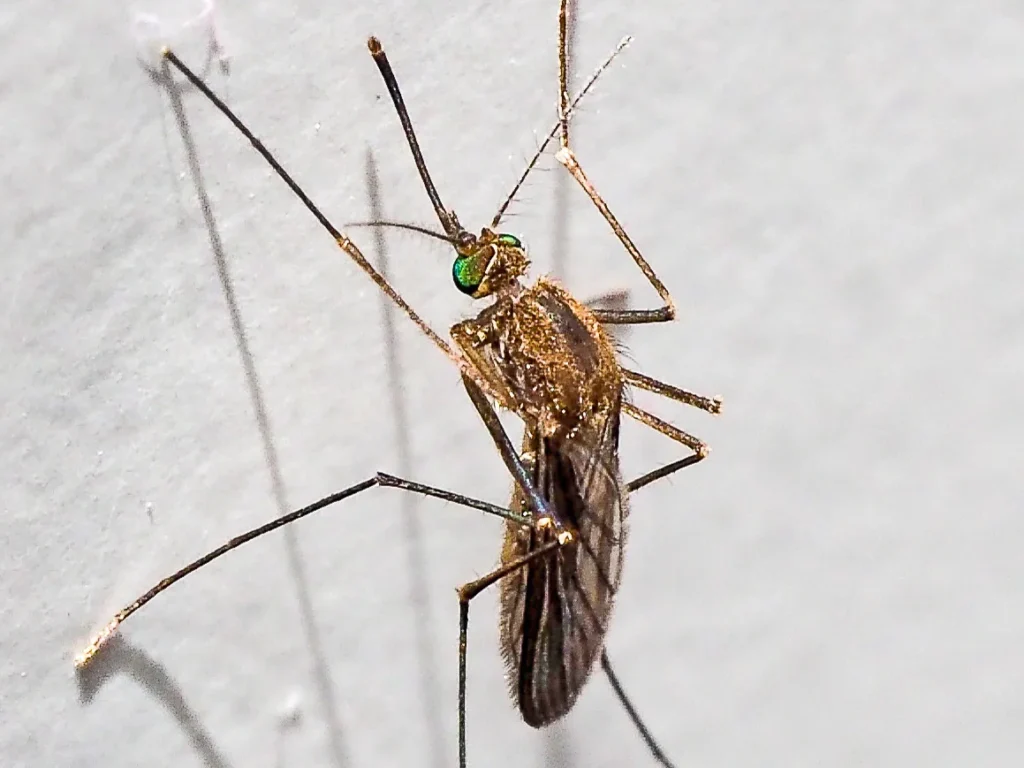
Oxitec’s Mosquito Control Strategy
• Oxitec uses mosquitoes to combat diseases.
• Male mosquitoes carry a gene to prevent An. stephensi mosquitoes from surviving into adulthood.
• The gene is passed through mating, targeting only An. stephensi mosquitoes.
• U.S. Food and Drug Administration and EPA confirmed Oxitec mosquitoes’ non-threatening nature.
• Djibouti’s government plans to release Oxitec mosquitoes next year[2024] in Djibouti’s capital city.
The Release of 5 Billion Gene-edited Mosquitoes in Brazil. Will It Save Lives?
“It may sound like the premise for a horror movie, or a biblical plague”:
The World Mosquito Program plans to release five billion mosquitoes into Brazil.
“And the hope is they will help save lives.
“[Once] you see the reductions in disease transmission, it doesn’t seem like a horror movie any more,” Scott O’Neill, director of the World Mosquito Program” (CBC, April 2023)
Ref: https://www.cbc.ca/radio/thecurrent/mosquitos-dengue-fever-brazil-1.6815601
Implemented concurrently with the influx of 5 billion friendly mosquitoes, Brazil approved in March 2023 a vaccine against dengue.
In turn, the Brazilian government has confirmed its support for the creation of a Mosquito Factory which is slated to produce 5 billion mosquitoes a year starting in 2024.
I should mention that the British Company Oxitec has been actively involved in the development of genetically modified mosquitoes in the course of the last eight years:
“They will mate with the females of the ordinary mosquitoes, spawning babies with a genetically inbuilt flaw that causes them to die quickly.
Oxitec says its factory in the town of Piracicaba, northwest of Sao Paulo, can produce 60 million mutant mosquitoes a week.” (Phys.org, 2016)
A mosquito factory will open in 2024 and produce 100 million bugs each week
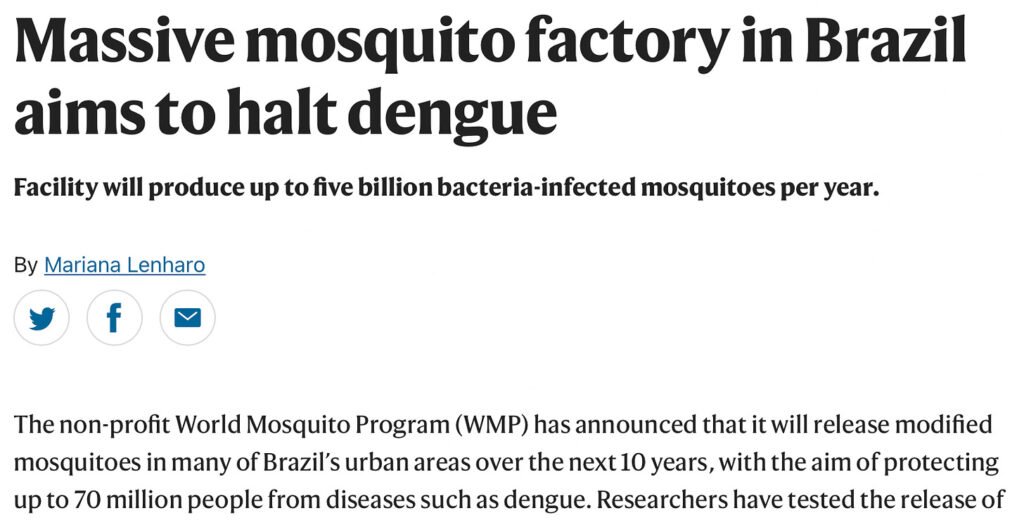
Now, the question is, are Oxitec mosquitoes being released in Africa to make malaria and dengue increase?
In addition to the risks posed by genetically modified mosquitos, there are also concerns about the experimental nature of the so-called “vaccine” being developed.
This lack of transparency and accountability has led many to question the safety and efficacy of these malaria “vaccines.” Without proper testing, there is no way to know for certain how effective they will be or what potential side effects they may have. This has sparked fears that the population of Africa could be used as guinea pigs in a dangerous experiment with unknown consequences.
The World Health Organization and its partner organization, the Bill Gates-controlled GAVI, announced [a] that they will be flooding Africa with 18 million doses of malaria vaccines.
[a] https://www.reuters.com/world/africa/nine-new-african-countries-receive-millions-malaria-vaccines-gavi-2023-07-05/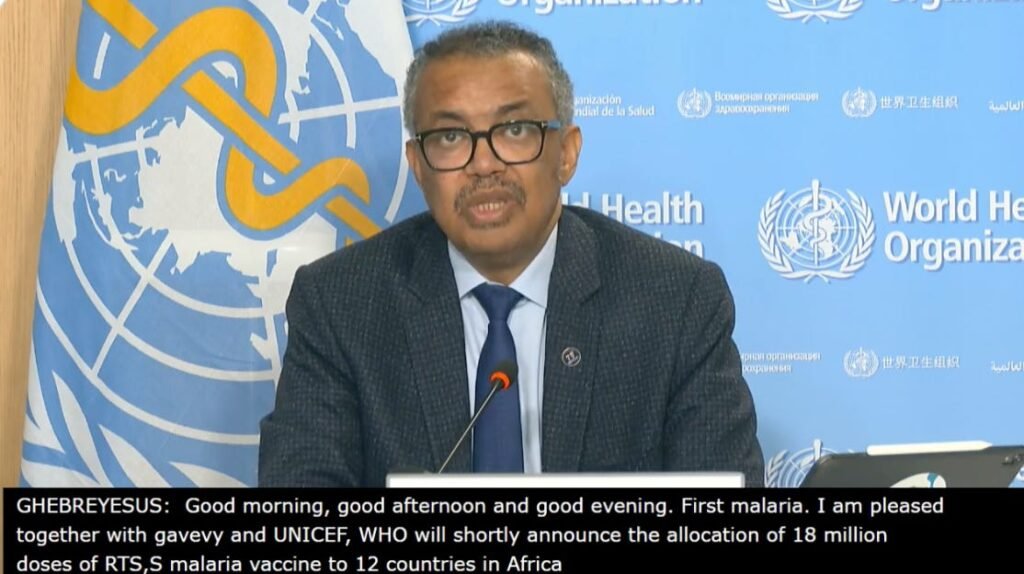
July 6, 2023: During the press conference, WHO director Tedros Adhanom declared that 12 African countries will be receiving 18 million doses of malaria vaccine in the coming months, declaring that climate change is largely responsible for the continuing disease burden in the continent
Malaria Epidemic in Africa: A Threat to the “Cure”
• Malaria is a major issue in Africa, causing annual deaths of about half a million children in sub Saharan Africa.
• Prior to the mid-20th century, only sanitation and living standards improved.
• Currently, medications prevent and treat malaria but do not provide sterilizing immunity.
• The only malaria “vaccine” is Mosquirix, produced by GSK.
Media briefing on global health issues with @DrTedros https://t.co/RVwUzXuujt
— World Health Organization (WHO) (@WHO) July 5, 2023
Mosquirix | World’s First Malaria Vaccine, WHO Approved | Production by Bharat Biotech
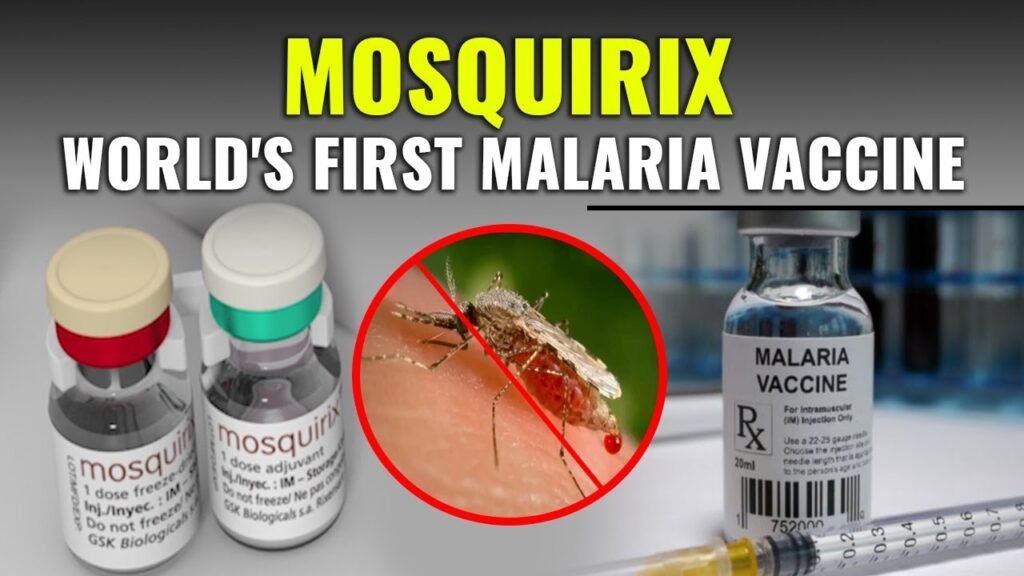
Mosquirix: Unreliable, Unsafe Drug
• Lacks sterilizing immunity.
• Requires 4 separate shots.
• Supposed preventive effects are short-lived.
• Often perceived as worthless and dangerous.
The Mosquirix trials conducted by McGill University showed low efficacy, with vaccine recipients faring worse than those in the placebo group [b].
[b] https://www.mcgill.ca/oss/article/health-and-nutrition/malaria-vaccines-success-story-hides-legitimate-concernsThe group that received the vaccine showed a ten times increase in the risk of meningitis and cerebral malaria, as well as a twofold increase in the risk of death when compared to the group that received the placebo. Despite the effectiveness of the vaccine, it does not provide any temporary or long-lasting sterilizing immunity or significant beneficial effects, therefore it would not decrease the overall disease burden in any manner.
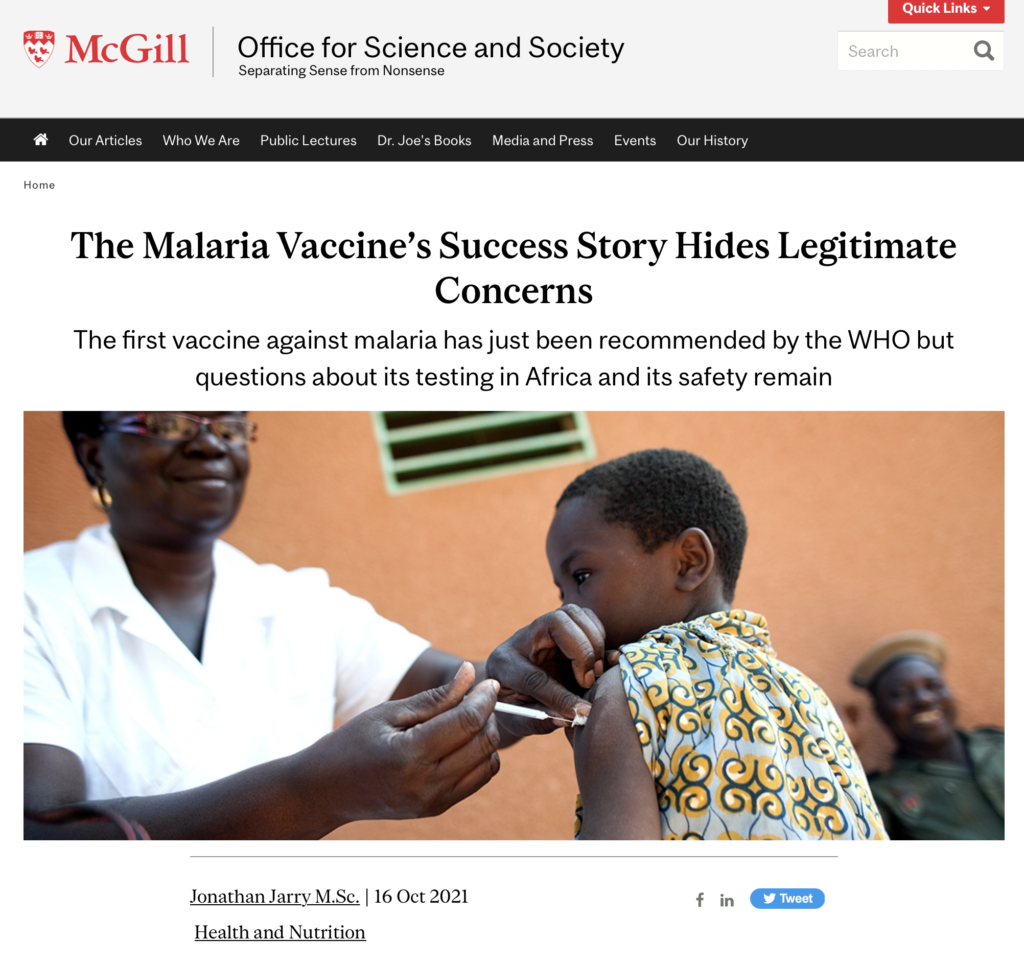
Despite this, the widely criticized and influenced World Health Organization has endorsed the risky vaccine, suggesting it for vulnerable young people. On the WHO’s official website, they assert without evidence that for every 200 malaria vaccinations administered, one child’s life will be preserved by the “vaccine.”
Last year, GSK, the sole provider of malaria shots, was granted a $170 million contract by UNICEF for the procurement of 18 million doses of its malaria injections at a cost of $9.44 per dose.
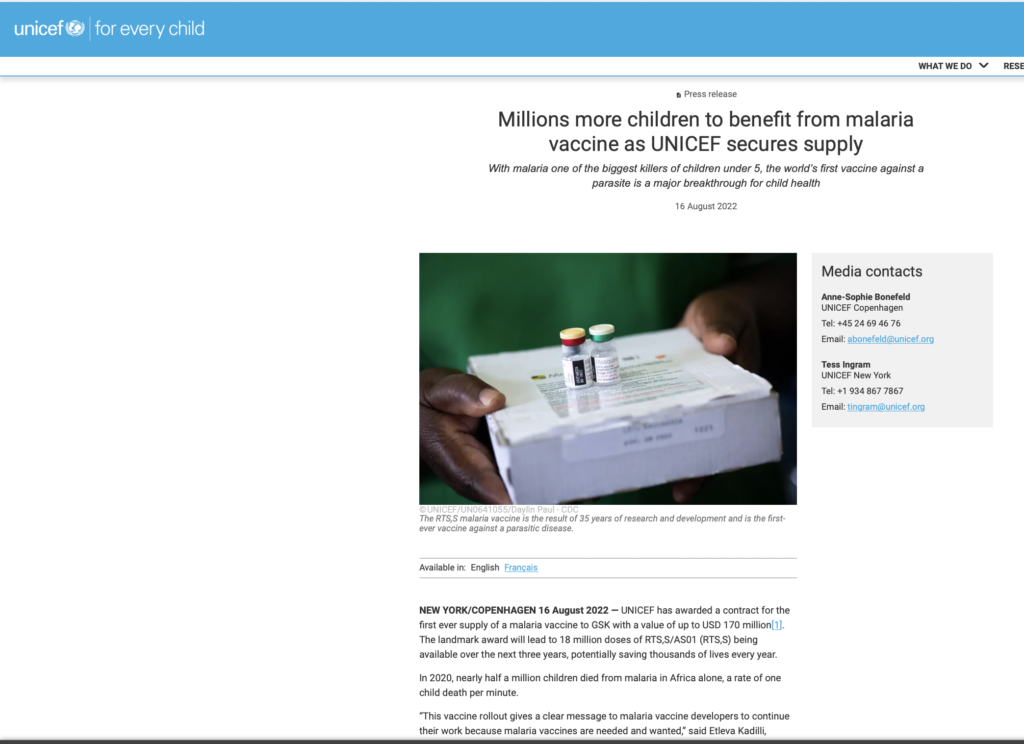
Gates Inc and its partners have just put out a document explaining their plan for giving out these shots. They want to make sure that 80-100 million shots are given to kids in sub Saharan Africa every year by 2030. If this happens, Africa could have a malaria vaccine business making almost $1 billion each year.

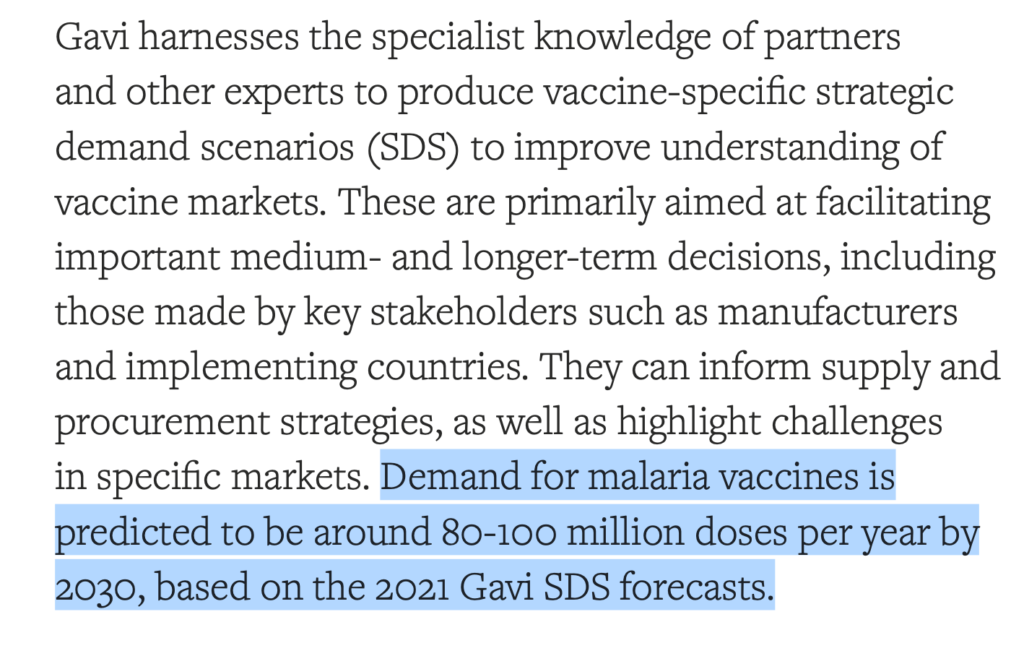
There’s no proof that these shots actually stop malaria, but that hasn’t stopped Big Pharma and global “Public Health” organizations from carrying out their plans in Africa.

Health Minister Veena George has issued a warning to districts as heavy rain continues in the state, highlighting the increased risk of epidemics attributed to climate change.
Ref: https://www.newindianexpress.com/states/kerala/2024/May/21/kerala-health-minister-issues-epidemic-warning
News from India coincides perfectly with a string of malaria scare reports emerging from Africa. However, rest assured that the corporate media will inform you about the progress of the Serum Institute of India in developing its own malaria vaccine.
Initiation of Shipment for the Newest Malaria Vaccine.
R21/Matrix-MTM vaccine availability begins in Africa in 2024

With the World Health Organization (WHO) ‘s recent Prequalification, a second malaria vaccine may soon become available in various countries.
The WHO estimates that the demand for malaria vaccines will be 40–60 million doses annually by 2026.
On May 20, 2024, Novavax, Inc. announced the first shipment of the R21/Matrix-M™ malaria vaccine [a] by its partner, Serum Institute of India (SII), to African countries with a high incidence of malaria, which is expected to begin in the coming weeks.
[a] https://www.precisionvaccinations.com/vaccines/r21-matrix-m-malaria-vaccineThe shipment was announced during a ceremony held at SII’s headquarters in Pune, India, attended by the Hon. Eric Garcetti, U.S. Ambassador to India; Adar Poonawalla, CEO of SII; Silvia Taylor, EVP, Chief Corporate Affairs & Advocacy Officer of Novavax; and other dignitaries.

Note: Vacccines never been safe and effective
Dr. Umesh Shaligram, Executive Director of R&D at SII, commented in a press release, “The commencement of the R21/Matrix-M™ Malaria Vaccine distribution to Africa represents a groundbreaking advancement in our mission to combat health inequalities worldwide.”
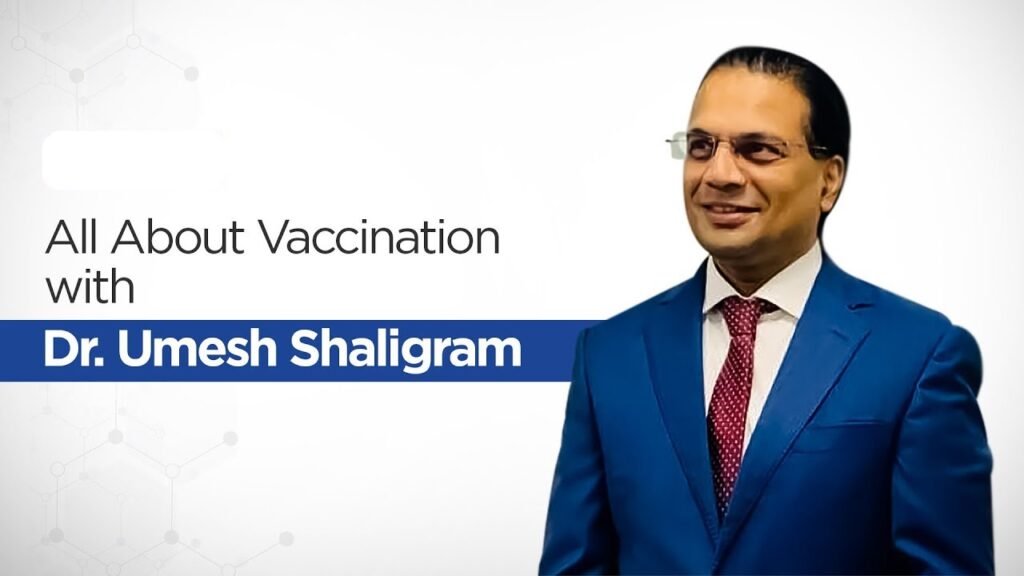
“At the SII, we are incredibly proud to collaborate with our esteemed partners, Novavax and the University of Oxford, as well as Gavi, UNICEF, and the WHO, to make this life-saving vaccine accessible and affordable to those who need it most.”
“By delivering this vaccine to the frontlines, we are not only protecting individuals but also empowering communities and paving the way for a brighter, malaria-free future.”
Created by the Jenner Institute of Oxford University and developed by SII, the R21/Matrix-M vaccine contains two key ingredients: the malaria-specific R21 antigen and Novavax’s saponin-based Matrix-M adjuvant to enhance the immune system response, increasing the magnitude and durability of the antibody response.
Phase 3 clinical trial results demonstrating safety and efficacy against clinical malaria in children were published in The Lancet in February 2024.
Of confirmed malaria cases in the United States, 59% were among persons who had traveled from Africa.
In the Americas, the Pan American Health Organization estimated that approximately 41 million people live in areas where the risk of infection by mosquitoes infected with malaria is moderate to high.
The U.S. Centers for Disease Control and Prevention says most malaria cases confirmed in 2024 are in cities such as Miami, Florida, Los Angeles, California, and San Juan, Puerto Rico.
As of May 20, 2024, the U.S. FDA had not approved either malaria vaccine.
But Serum Institute of India (SII), has shipped its first set of R21/Matrix-M malaria vaccine to Africa. The initial batch will be sent to the Central African Republic (CAR), with subsequent shipments planned for South Sudan and Democratic Republic of Congo. In total, 1,63,800 doses have been allocated for the CAR region, out of which only 43,200 doses were dispatched from SII, on May 20, 2024.
#WATCH| Pune, Maharashtra: On the first consignment of R21-Matrix-M Malaria vaccine doses flagged off to Africa, CEO Serum Institute of India Adar Poonawalla says, "The two countries coming together with the best scientists, manufacturing, academia, innovation all coming together… pic.twitter.com/SheJ8I8Sgu
— ANI (@ANI) May 20, 2024
Source: Only My Health-Image, Linkedin, Youtube, Wired-Image
Also Read:
